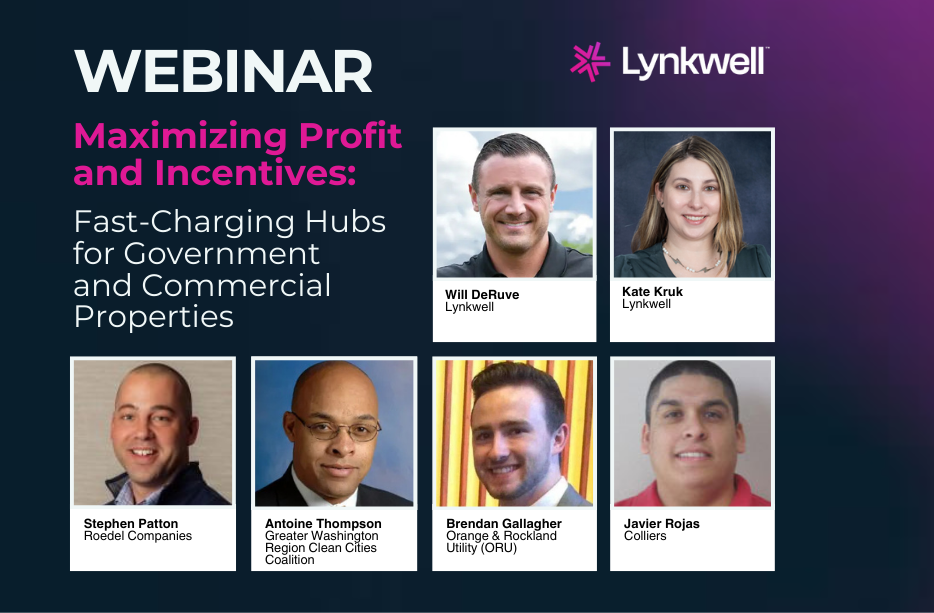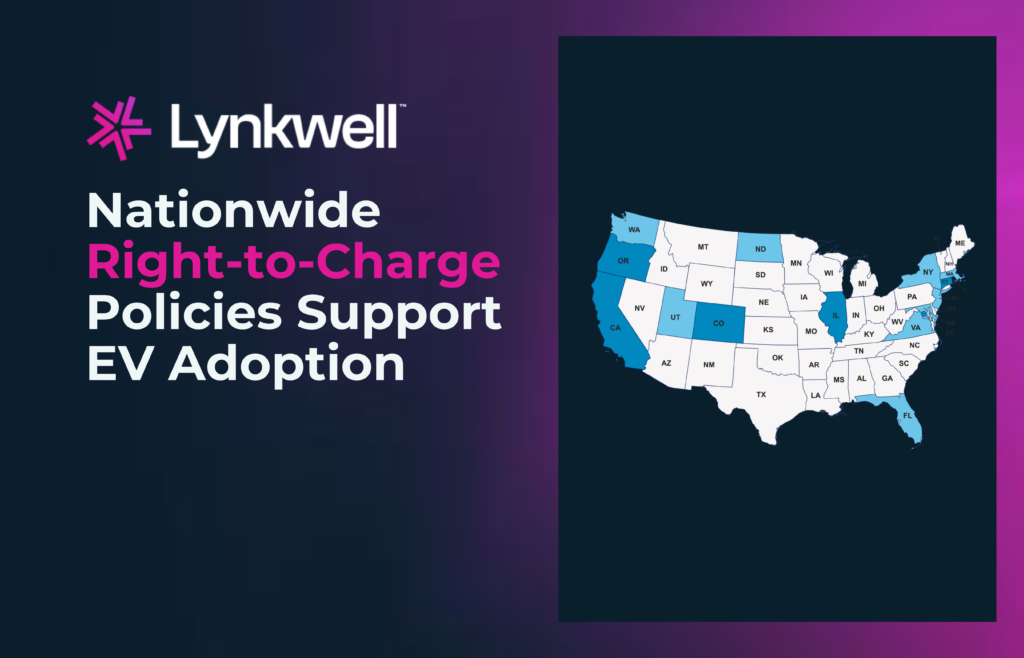7 min read
Maximizing Profit and Incentives: Insights from Lynkwell’s DCFC Hub Webinar

Lynkwell recently hosted a compelling webinar, “Maximizing Profit and Incentives: Fast-Charging Hubs for Government and Commercial Properties,” that brought together industry experts to discuss the transformative potential of funding incentives to accelerate the development of direct current fast charging (DCFC) hubs. As a top three charge point operator in the Northeast U.S., Lynkwell leveraged its position to bring together key leaders from its network of industry influencers to explore the economic opportunities, strategic planning, and technological advancements driving the expansion of EV charging infrastructure.
Experts Kate Kruk and Will DeRuve of Lynkwell, alongside valued partners Antoine Thompson of the Greater Washington Region Clean Cities Coalition, Brendan Gallagher of Orange & Rockland Utility, Javier Rojas of Colliers Engineering & Design, and Stephen Patton of Roedel Companies, highlighted the funding programs overcoming financial barriers and shared actionable strategies for property owners and municipalities to leverage these opportunities effectively.
The development of DCFC hubs involves a thoughtful allocation of resources, including hardware, installation, site preparation, and grid upgrades, to ensure a robust and reliable charging network. This is where funding programs like the National Electric Vehicle Infrastructure (NEVI) program and the Charging and Fueling Infrastructure (CFI) grant play a pivotal role. By providing financial support and guidance, these programs help bridge the gap between vision and execution.
NEVI Program: Building a Nationwide Charging Ecosystem
The National Electric Vehicle Infrastructure (NEVI) Program is a cornerstone of federal efforts to accelerate EV adoption and create a reliable, interconnected charging network across the United States. The program allocates $5 billion over five years to states to strategically deploy EV charging stations. NEVI guidelines mandate that EV charging stations be strategically positioned along designated alternative fuel corridors, aiming to eliminate range anxiety and support the development of a robust, nationwide EV charging network.
By early 2024, 33 states had issued solicitations for NEVI program projects, with 16 states moving forward to award contracts and begin installing charging stations. NEVI is more than just a funding program for individual stations—it emphasizes strategic planning to ensure the long-term success of the greater charging network. States are required to submit annual plans to the Federal Highway Administration and the Joint Office of Energy and Transportation, outlining how they intend to allocate NEVI funds.
For instance, New York State is set to receive approximately $175 million through NEVI over the next five years. This thoughtful approach ensures that charging infrastructure is developed in a way that maximizes accessibility and supports a nationwide network.
CFI Grant Program: Addressing Diverse E-Mobility Needs
The Charging and Fueling Infrastructure (CFI) Discretionary Grant Program complements NEVI by providing $2.5 billion over five years to strategically deploy publicly accessible EV charging and alternative fueling infrastructure. The CFI program offers two funding categories: Community Charging and Fueling Grants and Alternative Fuel Corridor Grants. The CFI program supports projects in urban, suburban and rural areas, providing flexibility to target underserved communities, public spaces and multi-use properties.
For example, New York State Energy Research and Development Authority (NYSERDA) was awarded $15 million in the first round of CFI funding to deploy EV charging infrastructure in publicly accessible locations, including downtown areas, local neighborhoods and tourist destinations. NYSERDA plans to use the CFI funding to launch competitive solicitations for projects to install Level 2 charging stations at more than 200 locations across the state, as well as DCFC chargers in small- to medium-sized cities. This approach demonstrates how CFI funding empowers local governments and businesses to advance EV infrastructure in diverse settings.
The Role of DCFCs in EV Infrastructure
Direct current fast chargers (DCFCs) play a crucial role in the electric vehicle (EV) charging infrastructure, particularly in high-traffic locations where rapid charging is essential.
- When compared to Level 2 chargers, DCFCs offer significantly faster charging capabilities, making them ideal for locations with low dwell times.
- As EV adoption increases, evidenced by EVs now representing almost 10 percent of the light-duty vehicle market, charging options that align with drivers’ daily routines are becoming more imperative.
- DCFC stations are also essential for enabling long-distance travel and road trips, particularly in rural areas where charging infrastructure is sparse. By providing fast, reliable charging along highways and in underserved regions and thus creating a network of fast-charging hubs, deploying strategically placed DCFCs is critical to enhancing the viability and growth of the EV economy.
- Creating fast-charging hubs also offers significant economic benefits, including revenue generation through charging fees and increased customer traffic.
- Additionally, providing fast-charging services enhances the customer experience by attracting and retaining visitors and customers, boosting brand perception and fostering customer loyalty.
Lynkwell’s panel discussion featured valuable insights from its vast network of thought leaders, each bringing unique perspectives on the economic benefits, strategic planning and funding opportunities that are making fast-charging hubs a vital component of the growing EV ecosystem.
Read on for webinar highlights.
- Javier Rojas from Colliers Engineering & Design highlighted the advantages of Level 3 charging, emphasizing how power-sharing technology can optimize energy distribution across chargers, ensuring efficiency and reliability without overloading the system. He emphasized the impact on regulatory compliance and energy efficiency, noting that these advanced chargers play a crucial role in tenant retention and user attraction, ultimately influencing the evolution of EV charging infrastructure.
- Antoine Thompson from the Greater Washington Region Clean Cities Coalition shared promising EV charging funding developments. The federal government has earmarked an impressive $7.5 billion to build EV infrastructure, a significant investment expected to expand the charging network across the nation. Thompson emphasized the importance of local communities staying informed about available grant opportunities to support the development of charging hubs.
- Stephen Patton from RGH Hospitality highlighted the advantages for the hospitality sector. Incorporating EV charging capabilities can provide hotels with a competitive edge. This strategy not only appeals to environmentally conscious travelers but also presents a valuable revenue stream. Hospitality businesses may want to explore this opportunity to enhance their offerings.
- Brendan Gallagher from Orange & Rockland Utility introduced the Power Ready program, a $19 million initiative offering incentives for EV infrastructure installation. This program underscores the potential benefits of collaboration between businesses and utility companies in expanding EV charging networks. However, as Gallagher noted, high-capacity charging projects may be subject to energy limitations.
- Will DeRuve, Lynkwell’s VP of North American Sales, presented case studies on successful EV implementations in local government. He cited Ulster County, NY Manchester, VT and New Mexico University as prime examples demonstrating the advantages of public charging stations and electric fleet solutions.
Conclusion
For stakeholders in government and commercial properties, now is the time to explore how these funding opportunities can support your EV charging initiatives. By leveraging programs like NEVI and CFI, you can position your property at the forefront of the burgeoning EV economy, meet emerging regulatory requirements and create a future-ready infrastructure that benefits both your business or organization as well as your community.
To learn more about funding opportunities and how to get started, explore our Rebate Finder tool or connect with our team for expert guidance in navigating the process and maximizing your investment.
Resources:
https://www.utilitydive.com/news/electric-vehicles-EVs-new-car-sales-2023/700799/
Related Insights
Discover news, perspectives, education and more from Lynkwell’s team of experts.

Two EV Experts, One Powerful Conversation
In May, Nick Bordeau, VP of Software Engineering, was honored as Tech Leader of the Year by the Electric …

Warranties vs. SLAs: How to Secure Your EV Charging Investment for the Long Haul
In a rapidly evolving EV (electric vehicle) charging landscape, ensuring charger reliability and operational stability i…

Nationwide Right-to-Charge Policies Support EV Adoption
As the adoption of electric vehicles (EVs) grows rapidly, ensuring equitable access to affordable EV charging is becomin…